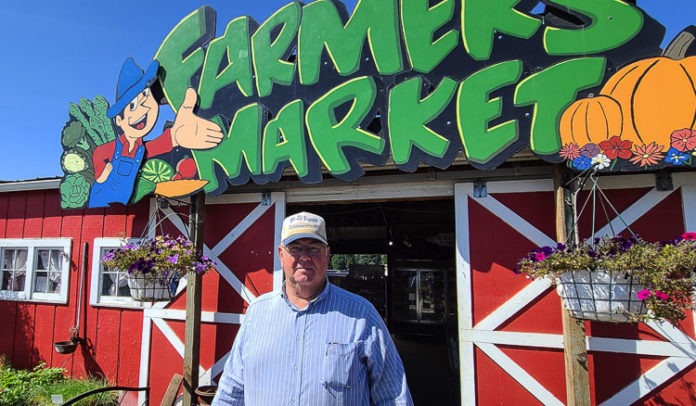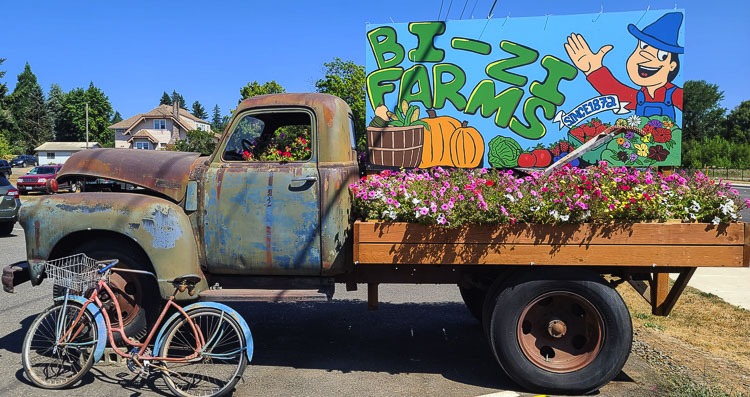
Editor’s Note: This article was produced and first published by Clark County Today, www.clarkcountytoday.com. It is published here with full attribution to and permission of ClarkCountyToday.com and Editor Ken Vance. The article was written by Clark County Today Reporter Paul Valencia.
This is a story more than 100 years in the making and a story that also just got started over the weekend.
A post on social media on Saturday noted that BiZi Farms was in a bind over a water rights issue, an issue that could impact BiZi’s ability to farm in the future. The Zimmerman family has been farming in Clark County since the 1800s.
“I love that we can be here for the community. Kids can come to the pumpkin patch. Families can buy fresh local products,” said Bill Zimmerman, co-owner of the family-run business. “It pleases me to no end when people pour in here to buy strawberries. We’re doing the best we can to take care of their needs.”
All of that is threatened now over a water rights issue.
The family installed a well on the property around 1900, before Washington water code debuted in 1917, and long before today’s water laws were written. Through the years, the family has made improvements to that well, Zimmerman said.
Zimmerman said that he thought his father applied for water rights in the 1970s. Turns out, it was for water certification. Zimmerman said he is not even sure of the difference but as soon as he realized the farm did not have water rights, back in 2008 or 2009, BiZi Farms applied.
It took 12 years, but the farm got word in November of 2020: The state of Washington’s Department of Ecology denied the application.
In a letter that was posted on social media, BiZi Farms noted, among a list of reasons, the DOE said that water must be reserved for its “highest and best uses,” and the DOE determined that the best uses are for development and developers.
“It’s the old Catch-22,” Zimmerman said. “I can’t have the water. But if I sell the land and a developer comes in, they can have all the water.”
Zimmerman used the words “bewildering” and “perplexing” while describing the ruling.

During the interview Monday afternoon at the farm, located at 9504 NE 119th St., in Vancouver, a family that was there to buy fresh food took a moment to visit with the livestock.
“Here’s a family enjoying the animals,” Zimmerman said, pointing to a mom and her children. “That’s not good use?”
Throughout the interview, dozens of customers arrived at the farm store. There have been few slow periods this summer, Zimmerman said. Since COVID, he said more and more people are realizing just where their food comes from, and they are placing a higher value on locally produced food.
Zimmerman questions the decision by the DOE.
“Does the community not mean anything to you folks? Thousands of people come through here looking for fresh fruit, fresh vegetables. Does that mean anything to the DOE?”
With the denial of water rights, Zimmerman answered his own question.
“They said, ‘We really don’t care.’ That, to me, is tragic.”
Zimmerman said he understands that the well needs a permit. The state asked for a test. The Zimmermans, working with a groundwater consulting firm, were told the test would be too costly and nearly impossible to conduct. The Zimmermans said the water table is unaffected by the farm’s well.
Calls to the Department of Ecology on Monday and Tuesday were unreturned prior to the posting of this story.
In March, Zimmerman said the farm received a notice from the enforcement division of the DOE, reminding the farm of the denial of water rights. BiZi Farms, Zimmerman said, is still irrigating its 105 acres, using the well, as the farm goes through the appeals process.
So, what happens if the farm cannot use the well or cannot find an affordable solution to find water from other sources? Zimmerman said the crop of strawberries would be cut 40 to 50%. Blackberries would be cut 65%.
“If we shut the water down … all the corn, cucumbers, the beans, the tomatoes, all of that will go away,” he added.
If that happens, decisions will have to be made.
For now, the farm is preparing for the family’s 150th year in Clark County. Zimmerman, with a laugh, insists that he has not been farming for 150 years. His family has.
Seriously, though, he is concerned about the future.
“We are working that out, trying to see if it would be worthwhile to even do it, to keep the farm store open,” Zimmerman said. “We don’t know.”
Zimmerman insists the farm is not asking for free water. He knows there will be costs associated with water rights. But he believes there has to be a way for the Department of Ecology to work with a farm that has nearly 150 years of history.
He hopes the community will have his back, too. He said he would appreciate it if his customers could reach out to the DOE and ask the agency to come up with a viable solution. The farm posted a link to a Google document with its point of view in this dispute, as well as ways to help: https://docs.google.com/document/d/16g__runYnlNydfeAej6Bknchh2aJTGPOmgnOWhwTTpE/edit


